人教高中英语必修3 Unit 2 Healthy eating Grammar课件(共27张PPT)
文档属性
| 名称 | 人教高中英语必修3 Unit 2 Healthy eating Grammar课件(共27张PPT) |

|
|
| 格式 | zip | ||
| 文件大小 | 2.2MB | ||
| 资源类型 | 教案 | ||
| 版本资源 | 人教版(新课程标准) | ||
| 科目 | 英语 | ||
| 更新时间 | 2020-03-03 00:00:00 | ||
图片预览

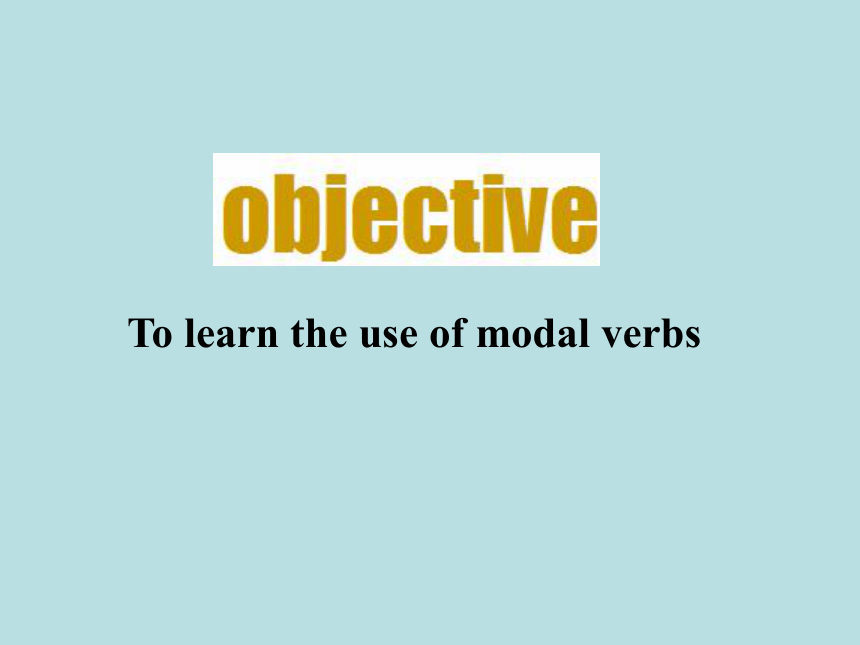
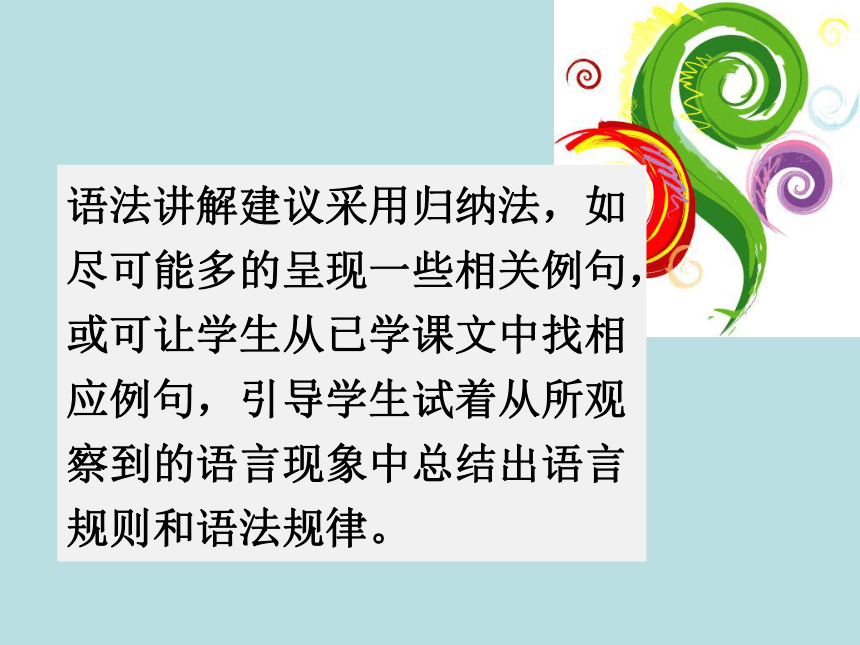
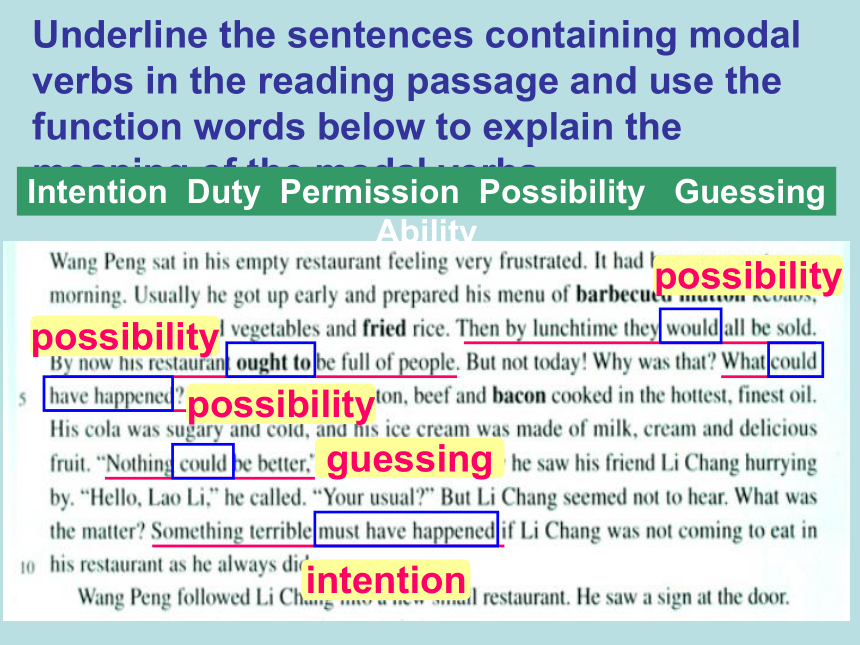
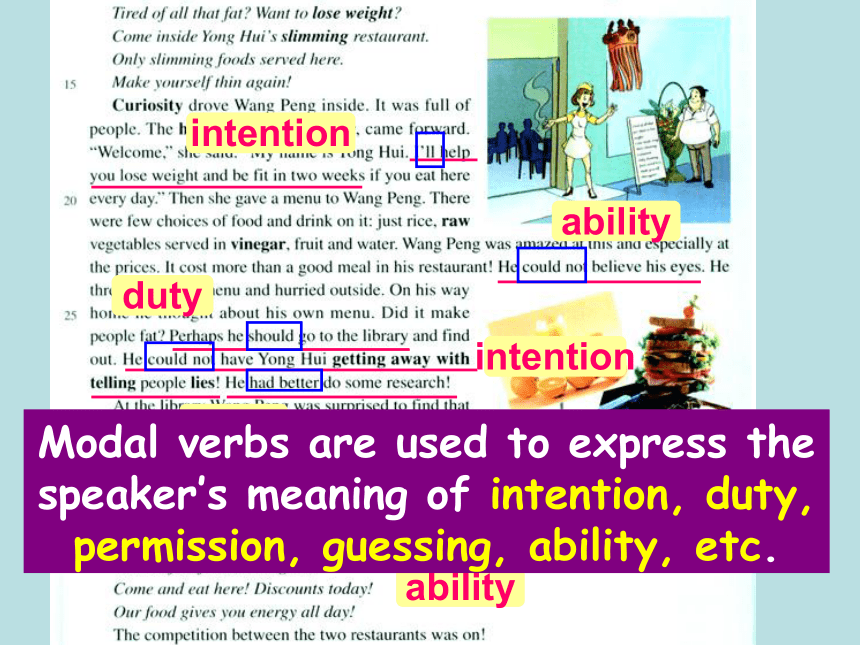
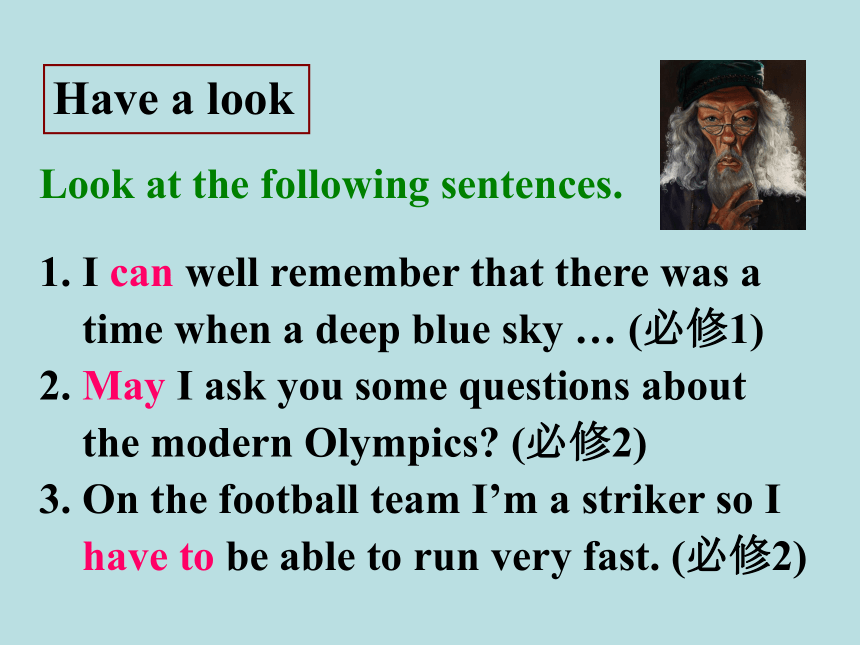
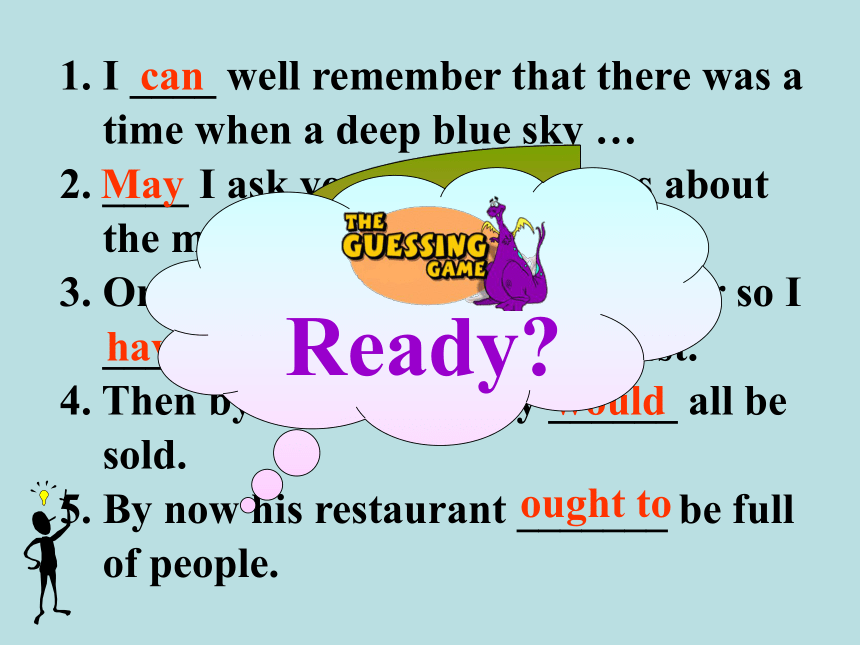
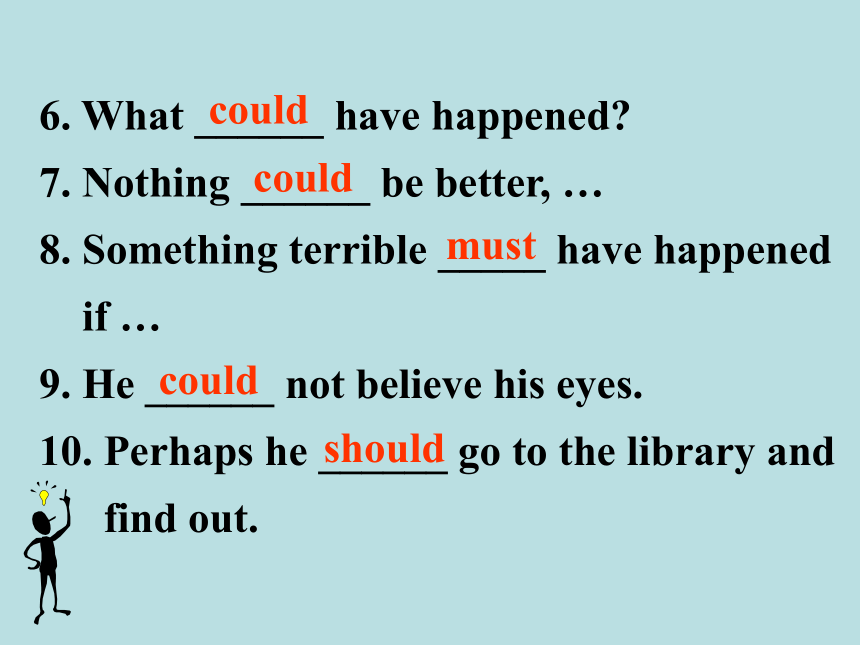
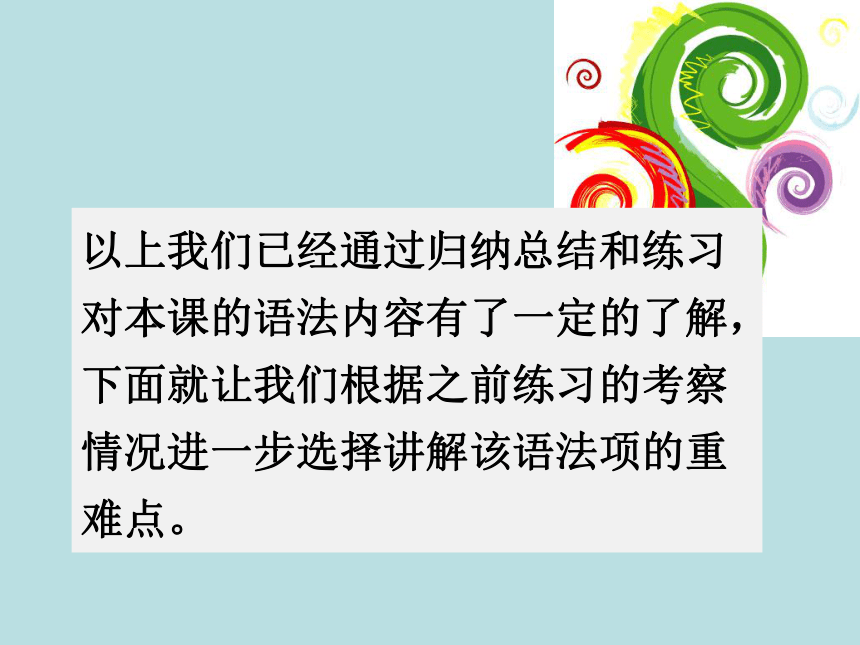
文档简介
(共27张PPT)
Healthy eating
Unit 2
Grammar
To learn the use of modal verbs
语法讲解建议采用归纳法,如尽可能多的呈现一些相关例句,或可让学生从已学课文中找相应例句,引导学生试着从所观察到的语言现象中总结出语言规则和语法规律。
Underline the sentences containing modal verbs in the reading passage and use the function words below to explain the meaning of the modal verbs.
Intention Duty Permission Possibility Guessing Ability
possibility
possibility
possibility
guessing
intention
intention
ability
duty
intention
duty
possibility
possibility
ability
Modal verbs are used to express the speaker’s meaning of intention, duty, permission, guessing, ability, etc.
Look at the following sentences.
I can well remember that there was a
time when a deep blue sky … (必修1)
2. May I ask you some questions about the modern Olympics? (必修2)
3. On the football team I’m a striker so I have to be able to run very fast. (必修2)
Have a look
1. I ____ well remember that there was a
time when a deep blue sky …
2. ____ I ask you some questions about
the modern Olympics?
3. On the football team I’m a striker so I
_______ be able to run very fast.
4. Then by lunchtime they ______ all be
sold.
5. By now his restaurant _______ be full
of people.
can
May
have to
would
ought to
go
Ready?
6. What ______ have happened?
7. Nothing ______ be better, …
8. Something terrible _____ have happened
if …
9. He ______ not believe his eyes.
10. Perhaps he ______ go to the library and
find out.
could
could
must
could
should
以上我们已经通过归纳总结和练习对本课的语法内容有了一定的了解,下面就让我们根据之前练习的考察情况进一步选择讲解该语法项的重难点。
1. ought to意为“应当;应该”,意思接近于should,但ought to语气更强。
You are his brother so you ought to take care of him.
2. 表示建议或劝告。
We ought to make a careful plan before we start the work.
3. 表示推测。
Henry ought to be there by now. He left home at six.
一、ought to/ ought not to
【拓展】
ought to have done对已发生的情况表示“责备或不满”,表示“本应该做某事”。
You ought to have told him not to go alone.
◆ 否定式为oughtn’t to或ought not to。
His doctor said to him that he oughtn’t to
smoke so much.
◆ 疑问式是将ought提前。
Ought I to hand in the homework today?
◆ 反意疑问句的疑问部分用should或ought
均可。
We ought to go by plane, shouldn’t / oughtn’t we?
have to表示“不得不;必须”,有人称、数和时态的变化。在口语中可用have got to代替have to。
It’s dark now. I have to go home.
◆否定形式是don’t have to,相当于needn’t。
You don’t have to go if you don’t want to.
◆疑问式为Do/Does/Did +主语+ have to…?
Do you have to wear uniforms at school?
二、have to / don’t have to
【拓展】
must与have to的区别
两者都表示“必须”,但must常表示说话人的主观看法,而have to一般强调客观需要。have to有人称、数和时态的变化,而must 则没有。
You must take good care of her.
I have lost my pen, so I have to buy one.
mustn’t表示“禁止;不准”;needn’t表示“不必;不需要”。
You mustn’t tell him about it. It’s a secret.
You needn’t tell him about it. He has known it.
【拓展】用must提问时的否定回答用needn’t或don’t have to。
— Must I finish my homework now?
— No, you needn’t / don’t have to.
三、mustn’t / needn’t
Choose suitable modal verbs from below to complete the following dialogues.
ought/oughtn’t to should/ shouldn’t mustn’t needn’t (don’t) have to will can/ can’t
have to
should
shouldn’t
needn’t
don’t have to/
needn’t/ shouldn’t
will
P13 2
ought/oughtn’t to should/ shouldn’t mustn’t needn’t (don’t) have to will can/ can’t
have to
mustn’t
ought to
should
根据汉语提示,完成下列英语句子。
1. 那个粗心的人因超速收到了一张罚单,他本不应该开那么快。
The careless man received a ticket for speeding, he _______________ so fast.
2. 他们应该明天来,是吗?
They ought to come tomorrow, __________?
3. —我必须要参加这次会议吗?
—你不必。你可以让汤姆替你去。
— Must I attend the meeting?
— No, you ________________. You can ask Tom to go instead.
oughtn’t to have driven
oughtn’t they / shouldn’t they
needn’t / don’t have to
4. 不该做的事我们都做了,而该做的事都没做。
We have done things we ____________ and haven’t done things we _______________.
5. — 我该不该把发生的一切都告诉他?
— 不行!他会生气的。
— _______________ tell him all that has happened?
— No, you ______________! He will be angry.
ought not to have done
ought to have done
mustn’t
Ought I to
复习下列情态动词:
ought to / ought not to / have to / don’t have to / mustn’t / needn’t
Ⅰ. 用ought to, ought not to, have to, don’t have to, mustn’t, needn’t填空。
1. You __________ go across the road when the traffic light is on red.
2. You __________ buy a gift, but you can if you want to.
3. As students, we _____________ put more energies into study.
4. He _____________ work overtime in order to finish the task before this Saturday.
mustn’t /
ought not to
needn’t /
don’t have to
ought to
has to
5. Tom ______________ have told me your secret, but he meant no harm.
6. The sun is shining brightly in a cloudless sky; it ______________ be a fine day today.
7. You don’t look well. You _____________ go to see the doctor.
8. A dog ran in front of my mother’s car and my mother ______________ stop very quickly.
ought not to
ought to
ought to
had to
I _______________ (得接受) your
suggestion.
2. You _________________ (你不能来这儿)
without permission.
3. You _________________ (应当去照顾)
your brother.
4. I think you _________________ (应当去
看) the doctor.
II. Translate the following sentences.
have to accept
mustn’t come here
should take care of
ought to go to see
5. The teacher told the students that they
____________________________________
(不应该在课堂上沉默不语) all the time.
6. You ______________________ (就得不到
我的支持) if you do such a thing.
7. — I waited for the train for two hours at
the station this morning.
— Well, you ________________________
(本来没有必要那么早去的).
8. “You _____________________ (你千万不
要再喝酒了),” the doctor warned him.
mustn’t drink any more
ought not to / shouldn’t keep silent in class
shall not get my support
needn’t have set off so early
III. 阅读下面的对话,按照句子结构的语
法性和上下文连贯的要求,在空格处
使用合适的情态动词填空。
'Do you call that a hat?' I said to my wife.
'You _______ be so rude about it,' my wife answered as she looked at herself in the mirror.
I sat down on one of those modern chairs with holes in it and waited. We had been in the hat shop for half an hour and my wife was still in front of the mirror.
needn't
'We _______ buy things we don't need,' I remarked suddenly. I regretted saying it almost at once.
'You _______ have said that,' my wife answered. 'I _______ remind you of that terrible tie you bought yesterday.'
mustn't
needn't
needn't
'I find it beautiful,' I said. 'A man _____ never have too many ties.'
'And a woman _____ have too many hats,' she answered.
Ten minutes later we walked out of the shop together. My wife was wearing a hat that looked like a lighthouse!
can't
can
Finish the exercises
in Learning
English.
Healthy eating
Unit 2
Grammar
To learn the use of modal verbs
语法讲解建议采用归纳法,如尽可能多的呈现一些相关例句,或可让学生从已学课文中找相应例句,引导学生试着从所观察到的语言现象中总结出语言规则和语法规律。
Underline the sentences containing modal verbs in the reading passage and use the function words below to explain the meaning of the modal verbs.
Intention Duty Permission Possibility Guessing Ability
possibility
possibility
possibility
guessing
intention
intention
ability
duty
intention
duty
possibility
possibility
ability
Modal verbs are used to express the speaker’s meaning of intention, duty, permission, guessing, ability, etc.
Look at the following sentences.
I can well remember that there was a
time when a deep blue sky … (必修1)
2. May I ask you some questions about the modern Olympics? (必修2)
3. On the football team I’m a striker so I have to be able to run very fast. (必修2)
Have a look
1. I ____ well remember that there was a
time when a deep blue sky …
2. ____ I ask you some questions about
the modern Olympics?
3. On the football team I’m a striker so I
_______ be able to run very fast.
4. Then by lunchtime they ______ all be
sold.
5. By now his restaurant _______ be full
of people.
can
May
have to
would
ought to
go
Ready?
6. What ______ have happened?
7. Nothing ______ be better, …
8. Something terrible _____ have happened
if …
9. He ______ not believe his eyes.
10. Perhaps he ______ go to the library and
find out.
could
could
must
could
should
以上我们已经通过归纳总结和练习对本课的语法内容有了一定的了解,下面就让我们根据之前练习的考察情况进一步选择讲解该语法项的重难点。
1. ought to意为“应当;应该”,意思接近于should,但ought to语气更强。
You are his brother so you ought to take care of him.
2. 表示建议或劝告。
We ought to make a careful plan before we start the work.
3. 表示推测。
Henry ought to be there by now. He left home at six.
一、ought to/ ought not to
【拓展】
ought to have done对已发生的情况表示“责备或不满”,表示“本应该做某事”。
You ought to have told him not to go alone.
◆ 否定式为oughtn’t to或ought not to。
His doctor said to him that he oughtn’t to
smoke so much.
◆ 疑问式是将ought提前。
Ought I to hand in the homework today?
◆ 反意疑问句的疑问部分用should或ought
均可。
We ought to go by plane, shouldn’t / oughtn’t we?
have to表示“不得不;必须”,有人称、数和时态的变化。在口语中可用have got to代替have to。
It’s dark now. I have to go home.
◆否定形式是don’t have to,相当于needn’t。
You don’t have to go if you don’t want to.
◆疑问式为Do/Does/Did +主语+ have to…?
Do you have to wear uniforms at school?
二、have to / don’t have to
【拓展】
must与have to的区别
两者都表示“必须”,但must常表示说话人的主观看法,而have to一般强调客观需要。have to有人称、数和时态的变化,而must 则没有。
You must take good care of her.
I have lost my pen, so I have to buy one.
mustn’t表示“禁止;不准”;needn’t表示“不必;不需要”。
You mustn’t tell him about it. It’s a secret.
You needn’t tell him about it. He has known it.
【拓展】用must提问时的否定回答用needn’t或don’t have to。
— Must I finish my homework now?
— No, you needn’t / don’t have to.
三、mustn’t / needn’t
Choose suitable modal verbs from below to complete the following dialogues.
ought/oughtn’t to should/ shouldn’t mustn’t needn’t (don’t) have to will can/ can’t
have to
should
shouldn’t
needn’t
don’t have to/
needn’t/ shouldn’t
will
P13 2
ought/oughtn’t to should/ shouldn’t mustn’t needn’t (don’t) have to will can/ can’t
have to
mustn’t
ought to
should
根据汉语提示,完成下列英语句子。
1. 那个粗心的人因超速收到了一张罚单,他本不应该开那么快。
The careless man received a ticket for speeding, he _______________ so fast.
2. 他们应该明天来,是吗?
They ought to come tomorrow, __________?
3. —我必须要参加这次会议吗?
—你不必。你可以让汤姆替你去。
— Must I attend the meeting?
— No, you ________________. You can ask Tom to go instead.
oughtn’t to have driven
oughtn’t they / shouldn’t they
needn’t / don’t have to
4. 不该做的事我们都做了,而该做的事都没做。
We have done things we ____________ and haven’t done things we _______________.
5. — 我该不该把发生的一切都告诉他?
— 不行!他会生气的。
— _______________ tell him all that has happened?
— No, you ______________! He will be angry.
ought not to have done
ought to have done
mustn’t
Ought I to
复习下列情态动词:
ought to / ought not to / have to / don’t have to / mustn’t / needn’t
Ⅰ. 用ought to, ought not to, have to, don’t have to, mustn’t, needn’t填空。
1. You __________ go across the road when the traffic light is on red.
2. You __________ buy a gift, but you can if you want to.
3. As students, we _____________ put more energies into study.
4. He _____________ work overtime in order to finish the task before this Saturday.
mustn’t /
ought not to
needn’t /
don’t have to
ought to
has to
5. Tom ______________ have told me your secret, but he meant no harm.
6. The sun is shining brightly in a cloudless sky; it ______________ be a fine day today.
7. You don’t look well. You _____________ go to see the doctor.
8. A dog ran in front of my mother’s car and my mother ______________ stop very quickly.
ought not to
ought to
ought to
had to
I _______________ (得接受) your
suggestion.
2. You _________________ (你不能来这儿)
without permission.
3. You _________________ (应当去照顾)
your brother.
4. I think you _________________ (应当去
看) the doctor.
II. Translate the following sentences.
have to accept
mustn’t come here
should take care of
ought to go to see
5. The teacher told the students that they
____________________________________
(不应该在课堂上沉默不语) all the time.
6. You ______________________ (就得不到
我的支持) if you do such a thing.
7. — I waited for the train for two hours at
the station this morning.
— Well, you ________________________
(本来没有必要那么早去的).
8. “You _____________________ (你千万不
要再喝酒了),” the doctor warned him.
mustn’t drink any more
ought not to / shouldn’t keep silent in class
shall not get my support
needn’t have set off so early
III. 阅读下面的对话,按照句子结构的语
法性和上下文连贯的要求,在空格处
使用合适的情态动词填空。
'Do you call that a hat?' I said to my wife.
'You _______ be so rude about it,' my wife answered as she looked at herself in the mirror.
I sat down on one of those modern chairs with holes in it and waited. We had been in the hat shop for half an hour and my wife was still in front of the mirror.
needn't
'We _______ buy things we don't need,' I remarked suddenly. I regretted saying it almost at once.
'You _______ have said that,' my wife answered. 'I _______ remind you of that terrible tie you bought yesterday.'
mustn't
needn't
needn't
'I find it beautiful,' I said. 'A man _____ never have too many ties.'
'And a woman _____ have too many hats,' she answered.
Ten minutes later we walked out of the shop together. My wife was wearing a hat that looked like a lighthouse!
can't
can
Finish the exercises
in Learning
English.
同课章节目录
